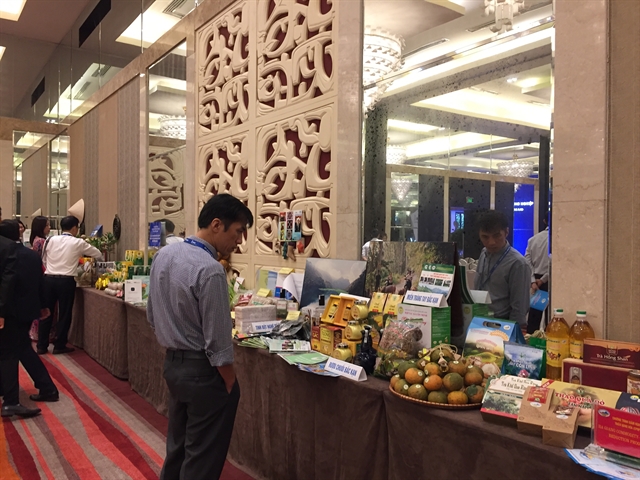 Environment
Environment


|
| Products made by projects supported by the International Fund for Agricultural Development are on display on its 25th anniversary in Việt Nam. — VNS Photo Khoa Thư |
HÀ NỘI — Mobilisation of private investment in rural areas, micro finance for women and smart climate change adaption are the three top priorities for the International Fund for Agricultural Development in Việt Nam, its associate vice president, Donal Brown, said.
IFAD came to Việt Nam in 1993 in the early stages of đổi mới.
It has since supported 15 projects in 11 provinces, directly benefiting nearly 750,000 households. Of their total cost of US$565.4 million, IFAD provided $377.5 million in the form of loans.
IFAD’s current strategy includes deepening institutional and policy reforms at the provincial level, building capacity among poor farming households and adapting to the effects of climate change, especially in rural areas, home of 70 per cent of the Vietnamese population.
Thomas Rath, its country director, said: “Our programme in Việt Nam is not only about finance, rural transformation and innovation. It is also and really about people. IFAD is a people-centred organisation. We invest in rural people while focusing on activities that have the greatest impact on residual poverty in rural areas.”
Deputy Minister of Finance Huỳnh Quang Hải hailed IFAD’s contributions to Việt Nam’s poverty fight but said much remains to be done.
“Việt Nam and the Vietnamese people attach importance to and cherish the co-operation with IFAD. We are willing to continue our … joint efforts with IFAD to eliminate poverty and accelerate agriculture development in the country.
“Based on our initial joint success, it is very important for us to replicate and scale up interventions, models and practices which have proven effective and impactful in 11 provinces.
“It is equally important to encourage more women to join the development process and leave no one behind.”
IFAD is now carrying out several projects related to sustainable development, commodity (not clear)-oriented poverty reduction, climate change adaption, and commercial smallholder support in the provinces of Hà Tĩnh, Quảng Bình, Hà Giang, Bến Tre, Trà Vinh, Bắc Kạn, and Cao Bằng. — VNS




